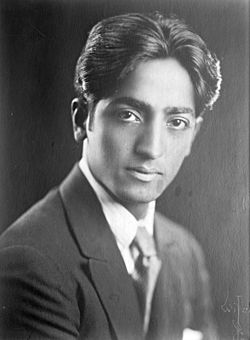Krishnamurti facts for kids
Quick facts for kids
Krishnamurti
|
|
|---|---|

Krishnamurti 1920s
|
|
| Born | 11 May 1895 Madanapalle, Madras Presidency, British Raj
|
| Died | 17 February 1986 (aged 90) |
| Cause of death | Pancreatic cancer |
| Occupation | public speaker, mystic, author, philosopher |
Jiddu Krishnamurti (born May 11, 1895 – died February 17, 1986) was a famous speaker from India. He talked about big ideas like life, truth, and how people think. His life had two main parts. First, he was part of a group called Theosophy. Later, he decided to leave that group. He believed that truth is something you find on your own, not through any specific religion or group.
Early Life and Theosophy
Krishnamurti was born in India into a Brahmin family. This was a traditional group in Indian society. When he was a teenager, he met a man named Charles Webster Leadbeater. Leadbeater was an important leader in the Theosophical Society. This group studied spiritual ideas and hidden knowledge.
Krishnamurti was then raised by Leadbeater and Annie Besant. They were both leaders of the Theosophical Society. They thought Krishnamurti would become a special leader. They believed he would be a "World Teacher" for everyone. Annie Besant even won a court case to take care of Krishnamurti and his brother.
A New Path: Freedom
As a young man, Krishnamurti decided to step away from Theosophy. He closed down a large group called the Order of the Star in the East. This group was created to support the idea of him being a World Teacher. He also left other groups linked to the Order and the Theosophical Society.
He returned all the money and land that people had given to the Order. This included a castle and a large area of land. From then on, he said he belonged to no country, social group, religion, or way of thinking.
Traveling and Teaching
Krishnamurti spent the rest of his life traveling the world. He spoke to many people, both in large groups and one-on-one. He wrote many books, like The First and Last Freedom and The Only Revolution. Many of his talks and discussions were also written down and published.
Krishnamurti did not want people to follow him like a guru. He felt that following someone else could make people too dependent. He accepted gifts and money from people who liked his work. This helped him continue his talks and publish his books for over 50 years.
He always told people to think for themselves. He invited them to explore and discuss important topics with him. He talked about how our minds work and how we can change ourselves. He also spoke about meditation, human relationships, and how to improve society. He believed that real change must come from inside each person. No outside group, like a religion or government, could make this happen.
Today, groups in India, Great Britain, and the United States support his ideas. They run schools based on his thoughts about education. They also continue to share his thousands of talks, discussions, and writings. These are available in many forms and languages.
 | Ernest Everett Just |
 | Mary Jackson |
 | Emmett Chappelle |
 | Marie Maynard Daly |

